Night Sweats
Extreme nighttime sweating, NOT due to an overheated room, excess blankets, etc., is fairly common. In one study of 2,267 people visiting primary care physicians, 41% said they experience night sweats.
Sometimes excess nighttime sweating is called “night sweats” or severe nighttime “hot flashes.” These episodes are described as drenching sleepwear and sheets and disrupting sleep; and are not due to an overheated sleep environment. While not a type of primary focal hyperhidrosis, night sweats are something the International Hyperhidrosis Society often receive questions about. For this content, we talked to the International Hyperhidrosis Society Board of Directors President and founding member, Dr. Dee Anna Glaser. Dr. Glaser is Professor of Dermatology for the Saint Louis University School of Medicine, St. Louis, Missouri.
"This is an important category," says Dr. Glaser. "Experiencing night sweats could be significant. Don't disregard it. Drenching night sweats or a change in a patient's pattern of sweating has to be evaluated." Many different medical conditions can cause night sweats.
Medical conditions that may cause night sweats include:
- Hormonal shifts such as with menopause and perimenopause. Other hormonal changes in women can also cause night sweats. Drops in testosterone in men can also lead to night sweating.
- Infections. Such as tuberculosis, endocarditis, osteomyelitis, abscesses, and HIV infection.
- Cancer. Night sweats can be an early symptom of some cancers, especially lymphoma. With cancer, however, night sweats are not usually the only symptom.
- Hypoglycemia.
- Hormone disorders including pheochromocytoma, carcinoid syndrome, and hyperthyroidism.
- Neurologic conditions. Although neurologic causes of night sweats are not common, they may include stroke, autonomic dysreflexia, and autonomic neuropathy.
- Acid reflux.
- Idiopathic night sweating.
- Some other conditions can be linked to night sweating, too. See a list from the Mayo Clinic here.
Medications are also a common cause of night sweats. Frequent culprits are antidepressants (WebMD says 8%-22% of people taking antidepressants experience night sweats), other psychiatric medicines, hormone therapy, and medications taken to decrease the level of glucose in the blood. Even medicine taken to lower fever (aspirin, acetaminophen) can lead to sweating. So can cortisone, prednisone, and prednisolone.
Flushing is different from night sweats. Flushing is redness of the skin, typically of the neck and cheeks that is sometimes confused with night sweats. There are a number of drugs that can cause flushing, including: niacin, nizagara 100, tamoxifen, hydralazine, nitroglycerine, and sildenafil.
"Most night sweating is not idiopathic," says Dr. Glaser. "There is usually an underlying medical condition that needs to be addressed."
Self-care tips for patients:
- Keep the bedroom at a moderate temperature. Use fans for air circulation and/or open windows.
- Wear moisture-wicking/quick-drying pajamas. Wear layers that can be removed as needed. Long underwear used for camping or comfortable exercise garments made of moisture-wicking fabrics may be good choices. Avoid non-breathable synthetics. Refer to the Fan Fave Products page for options and discounts.
- Use quick-drying, high-tech bedding - not cotton sheets. Use layers and adjust bedding as needed in the night. Some sheets are now made of the same material that athletes wear to wick moisture away from their bodies as they exercise and are specifically for night sweats.
- Sip ice water throughout the night.
- Keep a cool pack under the pillow and during the night flip the pillow occasionally. Consider a bucket of ice by the bed and some wash cloths to apply cool compresses as needed.
- Avoid nighttime sweat triggers such as spicy foods, cigarettes/nicotine, alcohol, and spicy food.
- Lower stress through calming, breathing, meditation exercises, or gentle yoga.
- Exercise daily, but not too close to bedtime.
Another option may be to consider a climate-controlling, airflow bed cover. According to a research poster presented at the Annual Meeting of the North American Menopause Society, a climate-controlling bed cover equipped with airflow can help women experiencing night sweats to achieve improvement in sleep quality and daytime functioning. In a study involving 36 women, average age 49.8 years, those using an airflow bed cover experienced reductions in anxiety, irritability, muscle and joint pain, hot flashes, and night sweats. They also experienced improvements in mood, energy levels, the ability to fall asleep and stay asleep, and waking times. Additional improvements were seen in the effects of sleepiness on relationships with family, friends, and work colleagues. Sleep quality was improved in 83%-94% of subjects (depending on the scale of measurement used.)
Depending upon the source of nighttime sweating, there are additional treatment options including oral medications.


